|
|
|
Sort Order |
|
|
|
Items / Page
|
|
|
|
|
|
|
| Srl | Item |
| 1 |
ID:
141155
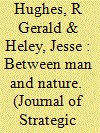

|
|
|
|
|
| Summary/Abstract |
This article argues for the continued relevance of the work and theories of the British Geostrategist Sir Halford J. Mackinder (1861-1947). It asserts that commentators and scholars who seek to marginalise Mackinder have too often dismissed his theories without setting them in the context of their continued endorsement in crucial areas of the globe. After 1945, despite his theories being tainted by association with Nazi Germany and Imperial Japan, both Moscow and Washington recognised the utility of Mackinder’s work and tailored policy accordingly. The end of Cold War saw Mackinder fall out of favour as his model was deemed unsuitable for policy analysis by a number of influential thinkers. It is argued here that, in recent years, the arena of international politics has seen a rehabilitation of Mackinder, accompanied by a resurgence of interest in Geopolitics. Finally, the piece examines those areas of the contemporary globe where Mackinder’s influence is greatest.
|
|
|
|
|
|
|
|
|
|
|
|
|
|
|
|
| 2 |
ID:
112792
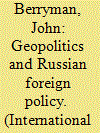

|
|
|
|
|
| Publication |
2012.
|
| Summary/Abstract |
The article provides a broad overview of the fluctuating connections between the controversial and ambiguous field of modern geopolitics and Russia. Given the pivotal significance of the Russian challenge within the early hypotheses of Mahan and Mackinder, the article first explores those distinctive geographical and spatial considerations that helped shape the development of the Russian Empire. The place of geopolitics in the Cold War is then reviewed, including both its policy orientation and the exchanges between the proponents of geopolitical realism and liberal internationalism. In conclusion, the article examines the post-Cold War renaissance of geopolitics, reviewing both theoretical developments and policy implications for Russian foreign policy.
|
|
|
|
|
|
|
|
|
|
|
|
|
|
|
|
| 3 |
ID:
121084
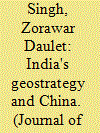

|
|
|
|
|
| Publication |
2013.
|
| Summary/Abstract |
Two recent events exemplify India's geopolitical dilemma. In early April 2013, it was reported that Chinese submarines had been conducting forays in the Indian Ocean that were apparently picked up by US Navy sonar.1 A few weeks later, there was a Chinese intrusion in the western sector where a platoon of Chinese troops entered the Depsang Valley area of eastern Ladakh.2 While the status quo ante was peacefully attained, the Ladakh incident is a vivid reminder of the abiding implications of an unresolved Himalayan dispute. Collectively, what both these events also evoke is a deeper contestation in India's geostrategy vis-à-vis China. India's geostrategy is being contested by Mackinder and Mahanian images, and some of India's strategic ambivalence can be traced to the lack of a welldefined geopolitical image to ground this debate.
|
|
|
|
|
|
|
|
|
|
|
|
|
|
|
|
| 4 |
ID:
141154
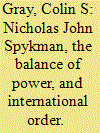

|
|
|
|
|
| Summary/Abstract |
Nicholas John Spykman was probably America’s finest geopolitical theorist of the twentieth century, even though he was an active participant over the course only of five years (1938–43). He is rightly viewed as a worthy intellectual successor to Sir Halford Mackinder in Britain. Spykman originated the (Eurasian) Rimland concept, which is of continuing political and strategic utility today. He was controversial and notably outspoken while his writings make it quite clear that his concern with the acquisition of power was contextualised by serious concerns for world order.
|
|
|
|
|
|
|
|
|
|
|
|
|
|
|
|
| 5 |
ID:
185640
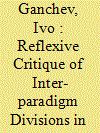

|
|
|
|
|
| Summary/Abstract |
This article begins by re-opening the Third Great Debate which established division lines between mainstream (realist/liberal/constructivist) and Critical (neo-Marxist/neo-Gramscian) theories of International Relations based on their different assumptions about the nature of the international system: anarchy and hierarchy, respectively. The first half of the article argues that adopting common definitions of these concepts makes the anarchy–hierarchy debate theoretically irresolvable and further demonstrates that mainstream and Critical theories do not share an understanding of these terms neither between, nor within, their own traditions. The second half of this article challenges and aims to correct the interpretation of three key political thinkers, Halford J. Mackinder, W. E. B. DuBois and Norman Angell as appropriated within the inter-paradigm debates of International Relations. It argues that the respective associations of these thinkers with early realism, critical theories and early liberalism are intellectually misguiding because their works exhibit a common understanding of the ‘international’ across macro- and micro-dimensions, which is uncharacteristic of ‘-isms’. This shows that popular interpretations of pre-1919 works through post-1919 paradigms can obscure more than they reveal. These findings do not seek to present new ideas but to produce a reflexive critique of IR which illuminates some, perhaps unintended, counter-productive systemic effects that inter-paradigm divisions can have on the discipline.
|
|
|
|
|
|
|
|
|
|
|
|
|
|
|
|
| 6 |
ID:
138972
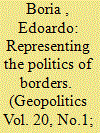

|
|
|
|
|
| Summary/Abstract |
The relationship between cartography and power has aroused much interest in recent years, stimulated by innovative critical approaches. The empiricist and neo-positivist paradigms, no longer satisfactory, have been abandoned, while the analysis has been extended to include not only state-sponsored, but also popular cartography. Regardless of the character of the map or its source, it continues to be inserted in the context of the modern territorial state, as it is perceived as a key instrument for conveying the state’s narrative. Seen in this light, cartography inevitably comes out on the subordinate end of this relationship, since it fully conforms to the orthodox state-centred world view that has dominated modernity. Overturning this mechanically deconstructionist approach, this paper proposes, instead, to apply a concept introduced by John Brian Harley, the father of critical cartography – that of the map’s internal power. This concept, usually considered a given and rarely tested in empirical studies, is evaluated here through an analysis of the border sign in a series of unorthodox maps (in the work of Reclus, Mackinder, Renner, Spykman, Horrabin, Radó, Ratzel, Kjèllen, Haushofer) which have received little scientific attention to date.
|
|
|
|
|
|
|
|
|
|
|
|
|
|
|
|
|
|
|
|
|